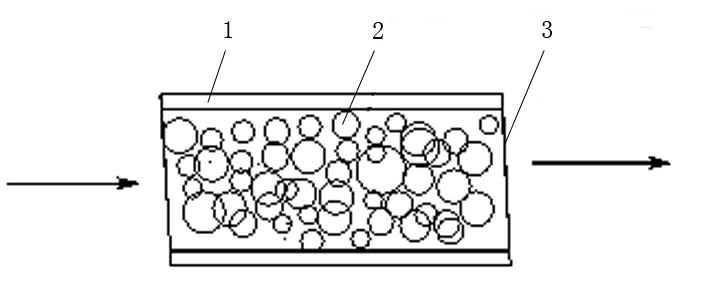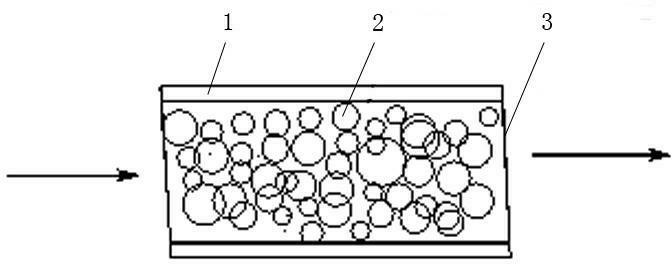Process for preparing polysucrose
A process method, the technology of polysucrose, which is applied in the field of compound preparation, can solve the problems of insufficient polysucrose yield and purity, and achieve the effects of short reaction process, less pollution and fewer procedures
- Summary
- Abstract
- Description
- Claims
- Application Information
AI Technical Summary
Problems solved by technology
Method used
Image
Examples
Embodiment 1
[0014] Put 80g of sucrose, 24ml (ie 24g) of distilled water, 40g of epibromopropane into a device with a thickness of 2cm on a ceramic membrane loaded with D201 resin, and react at 25°C for 2 hours. The pH of the reaction is 12, and the mixture is Polymerization is carried out on the strongly basic anion exchange resin, the temperature is raised to 60°C, and the reaction is continued for 2 hours, and then the reaction solution is eluted with distilled water, and the product low cross-linked polysucrose is adsorbed on the resin. The product was purified with acetone, and the low cross-linked polysucrose was eluted and graded with absolute ethanol. The selected low cross-linked polysucrose had a weight average molecular weight of 300,000.
[0015] Add 5 g of low cross-linked polysucrose, 20 ml of distilled water, and 3 ml of epibromohydrin to a 250 ml three-necked flask with a stirring device, and stir thoroughly to make it evenly mixed. Add 3ml of Span 85 to 150ml of chlorobenzene...
Embodiment 2
[0017] In a 250 ml three-necked flask with a stirring device, 5 g of the low cross-linked polysucrose prepared in Example 1, 20 ml of distilled water, and 4 ml of epibromohydrin were added, and fully stirred to make them uniform. Add 3 ml of Tween 85 to 150 ml of chlorobenzene into the mixture, and adjust the pH to 13 with aqueous sodium hydroxide. Then reacted in a water bath at 70°C for 1.5 hours, and a large number of microspheres appeared. After curing at 90°C for 9.5 hours, the product was filtered, washed with absolute ethanol and distilled water several times to obtain transparent spherical particles, dried, yield 95.9%, product purity 98.2 %.
Embodiment 3
[0019] In a 250 ml three-necked flask with a stirring device, 5 g of the low cross-linked polysucrose prepared in Example 1, 20 ml of distilled water, and 4 ml of epibromohydrin were added, and fully stirred to make them uniform. Add 4.2ml of Span 85 to 150ml of liquid paraffin into the mixture, and adjust the pH to 12 with aqueous sodium hydroxide. Then reacted in a water bath at 75°C for 1.5 hours, a large number of microspheres appeared, cured at 95°C for 10 hours, the product was filtered, washed with absolute ethanol and distilled water several times to obtain transparent spherical particles, dried, yield 94.6%, product purity 99.2 %.
PUM
| Property | Measurement | Unit |
|---|---|---|
| thickness | aaaaa | aaaaa |
| particle diameter | aaaaa | aaaaa |
Abstract
Description
Claims
Application Information
 Login to View More
Login to View More - R&D
- Intellectual Property
- Life Sciences
- Materials
- Tech Scout
- Unparalleled Data Quality
- Higher Quality Content
- 60% Fewer Hallucinations
Browse by: Latest US Patents, China's latest patents, Technical Efficacy Thesaurus, Application Domain, Technology Topic, Popular Technical Reports.
© 2025 PatSnap. All rights reserved.Legal|Privacy policy|Modern Slavery Act Transparency Statement|Sitemap|About US| Contact US: help@patsnap.com


